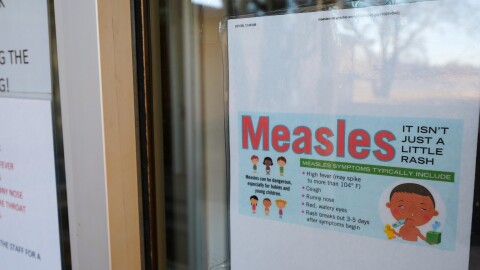-
North Carolina has seen 11 measles cases since December, with many of them occurring in communities where vaccination rates are below a level that would prevent community spread.
-
Since December, there have been 11 known cases of measles in North Carolina, stemming from the ongoing outbreak in South Carolina. State health officials have released a new dashboard to track cases in NC.
-
North Carolina needs $5 million for the federal government to provide $125 million for the SUN Bucks program. It helps feed more than a million kids.
-
UNC Health says last year, its providers began limiting medical services around gender transition to patients who are at least 19 years of age, in response to pending federal guidelines around this issue. This exceeds state law, which prohibits gender-affirming care for those under 18.
-
The state reported 63 additional flu deaths this week, bringing the season's total to 134 deaths. That's much higher than last year at this point.
-
The Trump Administration cut funding for Affordable Care Act navigators this year by 90%. In North Carolina, that meant about 60 fewer people helping people traverse the often-complicated signup process.
-
The state plans to keep its childhood vaccination schedule, which includes required and recommended shots that are no longer part of federal guidelines.
-
Once sustained on shoestring budgets, peer-run mental health spaces are expanding across North Carolina as state and local leaders invest in programs led by people with lived experience.
-
The patient has recovered, but several people remain under quarantine while health officials continue outreach and vaccination guidance.
-
State agencies are appealing to the state Supreme Court for a third time to keep from covering the entire health care costs for retirees promised years ago.
-
The North Carolina Department of Health and Human Services announced a case of measles on Wednesday in a child in Polk County. It was the second in the state this year and the first related to an outbreak in South Carolina.
-
It’s OK this time of year to tell someone to take a hike.














